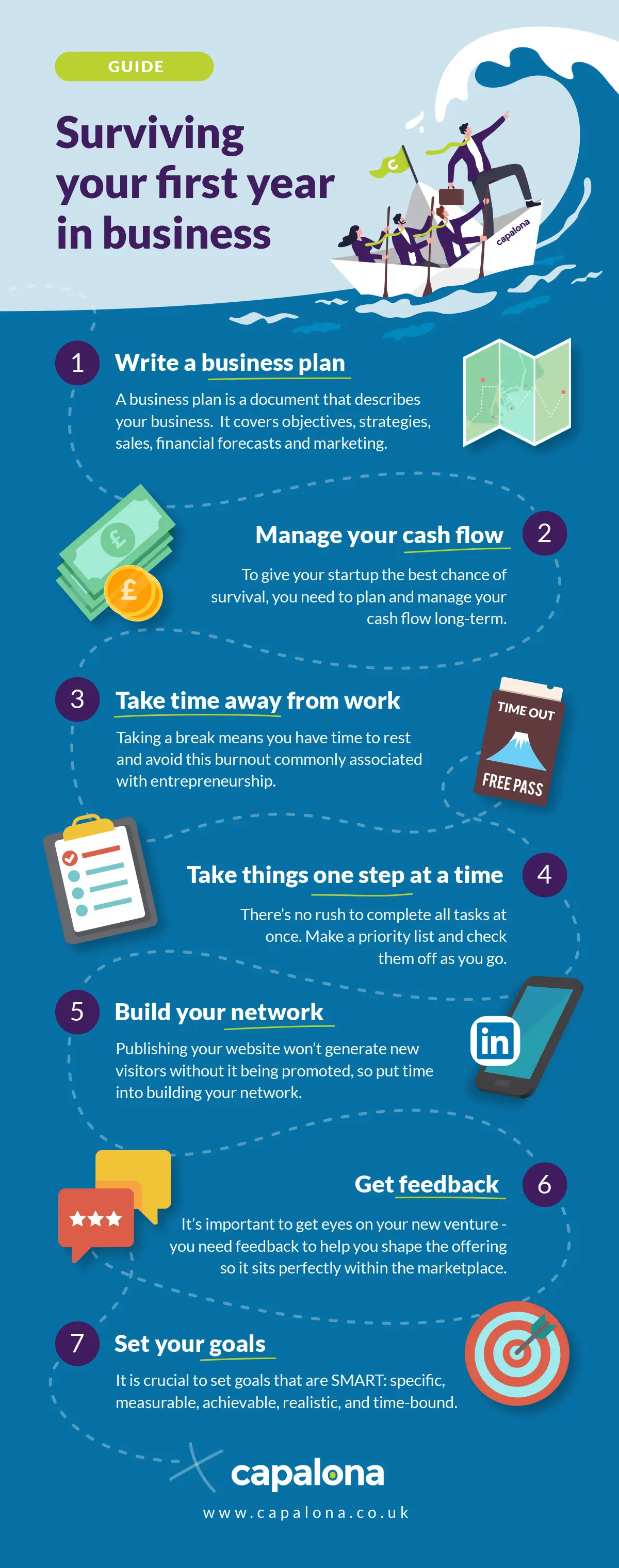Although many businesses can turn a profit in the first few months, for some, it can take a few years (reaching true success around the seven to ten-year mark). And some generate no profit in the first year at all, with 20% of small businesses failing within 12 months.
To launch, run, and grow a successful small business, you need more than just a fantastic business idea. So, if you’re hoping to start your own this year, here are some tips on surviving your first year, including common pitfalls and advice from current business owners.
What can you expect from your first year in business?
Your first year in business is a year you acquire a lot of new skills. From invoicing and accounting to sales and marketing strategies, you wear every hat, so it’s vital that you prepare as best you can for the year ahead.
You will make mistakes, though. But don’t worry; making mistakes is how you learn what not to do next time. You’ll probably lose customers, receive unpleasant emails, and question whether you’re doing the right thing, but this is all part of running your own business.
Over the next 12 months, be prepared to work hard and keep an open mind — you will need to be adaptable.

1. Create a comprehensive business plan
A business plan helps you map out your business journey — understand your market, analyse competitors, build pricing strategies and forecast cash flow. And a business plan isn’t just beneficial for you; it’s something angel investors and lenders might want to see if you plan to apply for business finance in the future.
So put some time and effort into understanding your competition, hone in on your target market and generally figure out what makes your business unique.
If you’re the only person in your business — and you plan to keep it that way, let’s say, a freelance graphic designer — you might not need an official business plan. But you should at least map out your expectations, how you plan to make money and take the time to perfect your value proposition. If you don’t know what makes your business different from the rest, you will struggle to tell people why they should choose you.
2. Make cash flow a priority
You need to plan and manage your cash flow long-term to give your startup the best chance of survival.
To adequately manage cash flow long-term, you need to be always mindful of spending. If there’s something you want but don’t need, put it on the back burner for now. You need to spend money on essentials, i.e. rent, bills, premises, website costs, inventory, staff, etc. Whatever your business needs to function, spend your money there, and spend it wisely.
Don’t be afraid to stand your ground with your clients; if you’re too lenient, they could pay your invoices late or not at all. So, set clear payment expectations from the start; unpaid invoices result in poor cash flow, which means your business will struggle to keep its head above water. Research by Intuit QuickBooks found that 38% of UK small business owners with cash flow issues have been left unable to pay debts.
If you’ve never run a business before, it’s also good practice to separate your personal finances from your business finances. This helps you keep track of business expenditures and incoming payments. You’ll always have a clear idea of how much money you have in the business, which means better-informed financial decision-making.
3. Take time away from your business
When you’ve just started your business, taking time away from it might sound counterproductive, but it isn’t. Running a new business can become all-consuming, meaning you never take a break and live and breathe everything business-related.
Only 13.5% of entrepreneurs maintain a healthy work-life balance, which is a pretty small proportion. And 50% of entrepreneurs face burnout. Resting is important. It helps you revitalise your body and your mind, putting you in the best position to make fresh business decisions.
4. Tackle just one thing at a time
Starting a small business means you’ve probably got a to-do list as long as your arm. When there’s just one of you in the business, it can easily seem impossible to finish anything. But take things one step at a time. There’s no rush to complete all of them at once. Make a priority list and check them off as you go.
Elliott, who started his eCommerce fulfilment company in July 2020, said that aside from building a strong online presence (capitalising on the retail shift to digitisation over the pandemic), he’s found focusing on one idea at a time helps propel his business forward.
Elliott said:
“A somewhat underrated skill as entrepreneurs is we tend to get shiny object syndrome, where we basically try and bite off more than we can chew, commit to lots of different projects and spread our focus thin. Especially in a time when the world is operating differently and things are rapidly changing, you need to be on your ‘A’ game, which means sole focus and dedication to your new start-up. You want to stack the odds in your favour as 20% of businesses fail in their first year.”
But how do you focus time and energy on just one task or idea? By breaking them down into smaller tasks. One large objective is overbearing and unnecessary. Instead of ‘launch business website’, break down the steps you need to take to launch the website and assign each task a time limit for you to complete.
5. Build your network
Building your network gives your business visibility. It gets your name out there and helps you build new relationships and partnerships to further promote your business.
If you have a B2B business, LinkedIn is the perfect platform to build your network. Build your personal brand through your profile, and set up a business page for users to learn even more about your business. Share insightful, educational content consistently, connect with your target audience and, most importantly, don’t get disheartened if you don’t see results right away.
Launching a brand-new business without a network of supporters is difficult. Consider offering your product at an introductory rate or providing users with a free period in exchange for feedback or a review.
6. Get feedback on your product or service
Olivier started his platform business, which helps connect job seekers and employers in their niche, in May 2020. He believes all new business owners should do everything they can to get their products out there and generate usable feedback.
Olivier says:
“One of the key factors in growing and improving Niceboard was the AppSumo deal we did about three months after we launched: we offered lifetime access to our product for a ridiculously low price which in turn allowed us to get tons of customer feedback and feature requests and essentially reach product-market fit faster than we would have with a slow trickle of regular paying customers.”
Offering discounted memberships to your new product means the buyer needs less consideration; the price is no longer a barrier to completing the purchase. When you’re just starting out, it’s important to get eyes on your new venture—you need feedback to help you shape the offering so it sits perfectly within the marketplace. And sometimes, the best way to do that is to invest in discounts and free trials.
7. Set goals for your first year in business
Setting goals can keep you motivated when starting your business. And your goals don’t have to be big or tied to your bottom line. They could be ‘reach 100 followers on Instagram’, ‘launch the website by X date’ or ‘reach out to ten customers for feedback’.
Before setting your goals, think about what would benefit your business most and map out how you plan to achieve them. It is crucial to set goals that are SMART: specific, measurable, achievable, realistic, and time-bound. Setting goals that cannot physically be achieved will only ruin your morale, setting you up for failure.
Consider finding an accountability partner if you struggle to set and achieve your goals. This might be a family member, friend or another business owner. Research shows that having an accountability partner makes it 65% more likely that you achieve your goals.
How to be sustainable in your first year of business
Although your priority will be to generate income in your first year, that doesn’t mean you have to throw sustainable practices out the window. Start small with your sustainability plan:
- Encourage remote working. If you have employees, consider implementing a remote or hybrid working policy (if possible). This policy can help cut carbon emissions (and cut office costs) and attract employees.
- Foster a recycle and reuse culture. For example, consider purchasing branded water bottles and reducing plastic usage. You can also consider incentivising staff to develop new ways to reuse materials.
- Eliminate paper and embrace digital. Instead of printing out meeting notes, use digital presentation formats and use digital collaboration tools where possible.
- Donate supplies in good condition when you upgrade equipment. For example, if you purchase new computers or laptops, consider donating them so their parts can be reused instead of contributing to landfills.
If you’re looking for a startup loan for your small business in the UK, we can help. Our free loan comparison tool is 100% free and will match your requirements with suitable finance options.
Compare interest rates, total repayable and more. Get a quote. (This won’t affect your credit score.)






